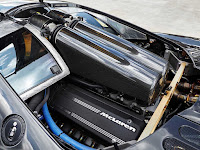Electric motors may represent the future of automotive propulsion, but we wouldn’t count the good old internal combustion engine down for the count just yet.
Further development of the fossil fuel-burning powertrain forges ahead with constant improvement. And leading the charge, as it turns out, is McLaren.
The exotic automaker is leading a consortium to improve the output and efficiency of the internal combustion engine with support from the British government’s Advanced Propulsion Centre. McLaren’s engine partner Ricardo is also part of the program, as are casting specialists Grainger & Worral, Lentus Composites, the University of Bath, and the BMW Group.
That last part has us particularly intrigued. The last time McLaren and BMW collaborated, we got the legendary McLaren F1, with its high-revving 6.1-liter V12 engine producing 618 horsepower. More recently, the Bavarian automaker pioneered a new water injection system to cool the engine’s combustion chamber. Applied in the M4 GTS, the system helps a 3.0-liter twin-turbo inline-six produce nearly 500 horsepower – a substantial increase over the standard M4’s 425 hp.
Could the water injection system help McLaren squeeze even more juice out of its 3.8-liter twin-turbo V8 engine? Undoubtedly, although there’s no saying that the technology will necessarily form part of the joint program.
“We will continue to independently design and build our own engines,” said McLaren chief Mike Flewitt, “and the benefits of this project will help us accelerate the development of our next generation of powertrain.”
The Woking-based supercar manufacturer is slated to slot an enlarged version of its M838T engine into the forthcoming 720S, displacing 4.0 liters and producing even more power than the 666 horsepower already extracted from the 675LT.









